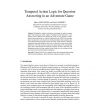92 search results - page 10 / 19 » A General Game Description Language for Incomplete Informati... |
ATAL
2006
Springer
13 years 11 months ago
2006
Springer
Learning to converge to an efficient, i.e., Pareto-optimal Nash equilibrium of the repeated game is an open problem in multiagent learning. Our goal is to facilitate the learning ...
UMUAI
1998
13 years 7 months ago
1998
We present an approach to keyhole plan recognition which uses a dynamic belief (Bayesian) network to represent features of the domain that are needed to identify users’ plans and...
CHI
2011
ACM
12 years 11 months ago
2011
ACM
Large-scale, ground-level urban imagery has recently developed as an important element of online mapping tools such as Google’s Street View. Such imagery is extremely valuable i...
AGI
2008
13 years 9 months ago
2008
Inhabiting the complex and dynamic environments of modern computer games with autonomous agents capable of intelligent timely behaviour is a significant research challenge. We illu...
EVOW
2010
Springer
14 years 2 months ago
2010
Springer
We investigate user-guided evolution for the development of virtual 3D building structures for the prototype (commercial) game Subversion, which is being developed by Introversion ...


